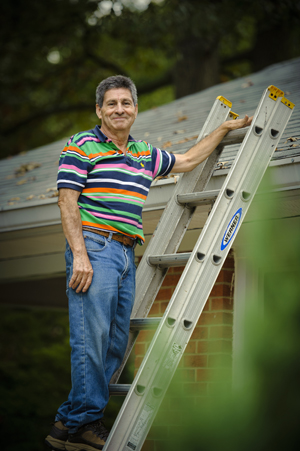Knee Replacement: Napoleon's Story
 Napoleon Funes worked for years repairing roofs. Though he’s since retired, he’s glad his new knees have allowed him to be active again.
Napoleon Funes worked for years repairing roofs. Though he’s since retired, he’s glad his new knees have allowed him to be active again.
The prospect of joint replacement surgery can be daunting—even for someone used to working on 40- to 50-foot-high roofs, like Napoleon Funes. He had never really considered joint replacement surgery until last year. It’s a big decision, but Napoleon’s mind was eased knowing that the Holy Cross Hospital Joint Center features a specially trained, multidisciplinary team of physicians, nurses and therapists.
The Time Was Right
After years of repairing roofs for a living, Napoleon, now in his 70s, was enjoying his retirement in Lanham, Maryland—spending time with his wife, taking walks around the neighborhood and golfing. But arthritis pain in his knees was beginning to interfere.
“I tried different medications, which worked for a little while,” he says. But relief would never last. Before long, Napoleon was in pain all of the time.
Antoni Goral, MD, orthopedic surgeon and medical director of the Holy Cross Hospital Joint Center, suggested joint replacement surgery for both of Napoleon’s knees.
Support at Every Step
At Holy Cross Hospital, patients experience an end-to-end approach to care that starts well before the surgery itself and continues through recovery.
In addition to conducting standard pre-operation examinations, the Holy Cross Hospital joint replacement team assessed Napoleon’s fitness and instructed him in exercises to prepare him for surgery on each knee, and his recovery. As part of his personalized treatment plan, Napoleon asked his wife to be his “coach” for the care journey. In this role, with direction from the hospital, she provided vital assistance to Napoleon with everything from transportation to help with daily activities, plus essential encouragement during recovery.
“We like to get a family member involved as a coach who can encourage the patient throughout their joint replacement,” Dr. Goral says. Having a coach available, such as a spouse, adult child or friend, is beneficial during recovery.
Before his first operation, Napoleon took a class at the hospital focused on joint replacement where he learned what to expect at every step, met caregivers and toured the attractive, private patient rooms.
A Life-Changing Difference
After such major surgery, a well-planned recovery is crucial for restoring patients’ mobility and getting them back to the activities of daily life.
“Movement is key to recovery,” says Dr. Goral.
Holy Cross Hospital’s physical therapy teams tailor treatment plans to a patient’s daily life at home, both right after surgery and for the long term. Exercises address range of motion, individual muscle strength and the ability to perform complex functions, like biking or walking up and down stairs.
Napoleon went to outpatient therapy for four weeks, every other day at first and then once a week. Today, he’s back to nearly full participation in everyday life.
“There’s definitely a lot of difference,” he says. “I can go out. I can drive a car.”
Dr. Goral says he’s seen patients return to a wide range of activities. “I’ve seen former patients enjoy kayaking, swimming, playing tennis and rock climbing.”
